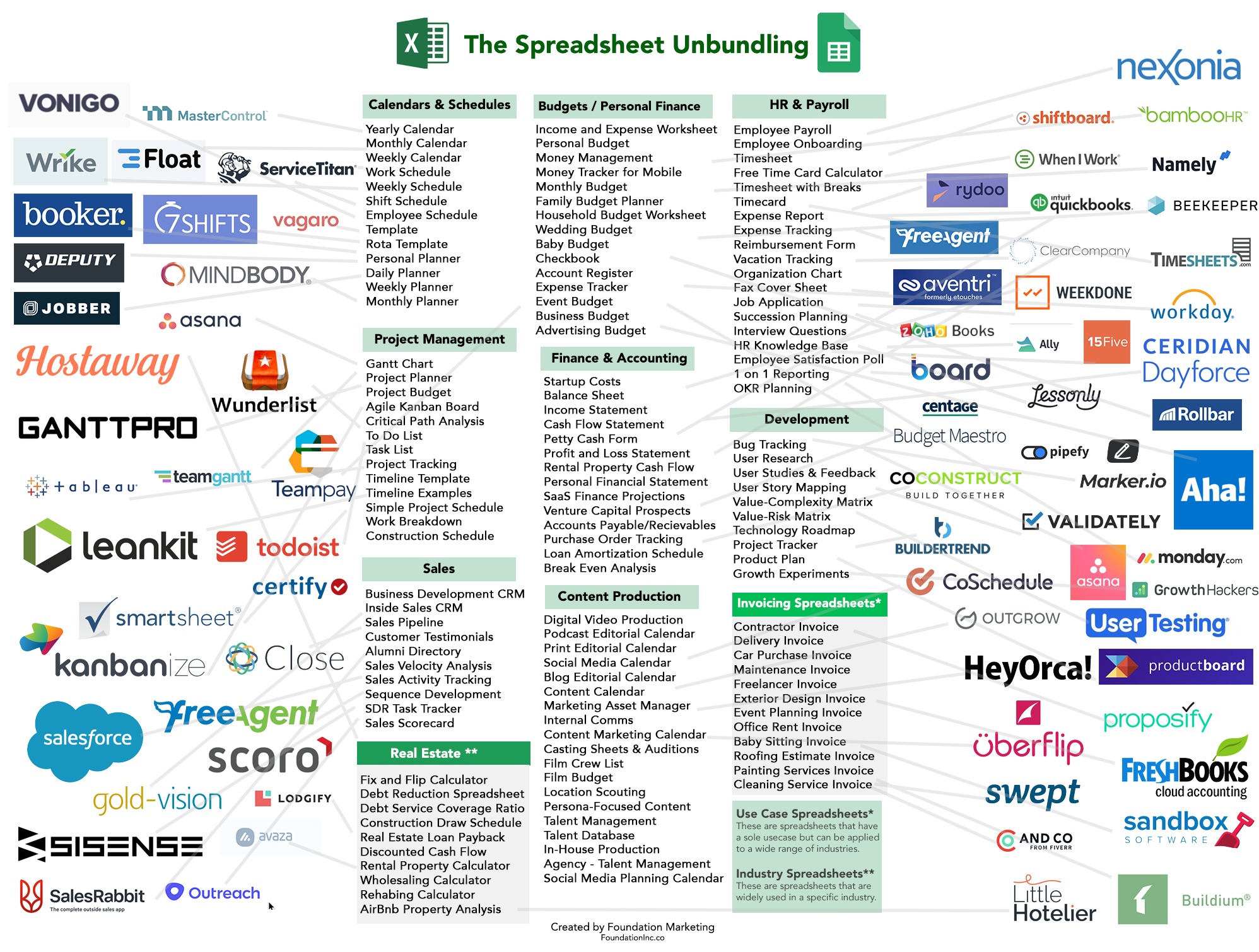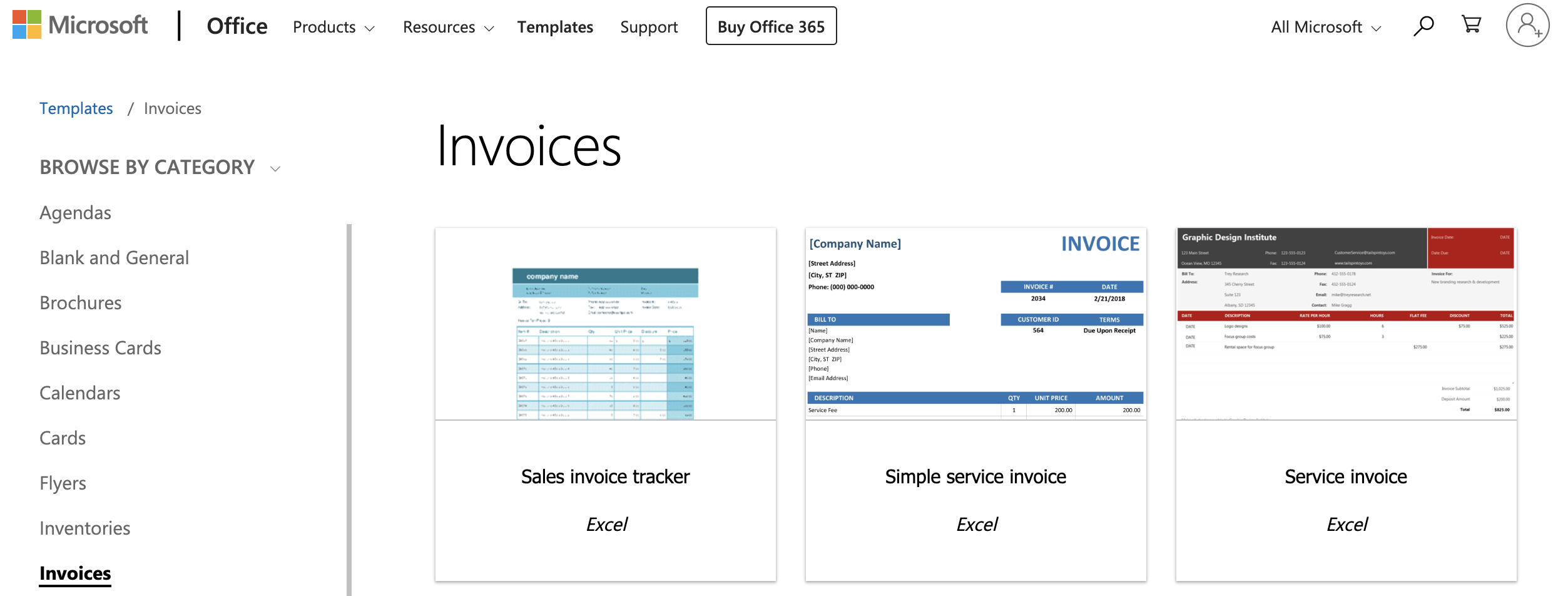Excel is your biggest competitor.
You might think your competition is another SaaS company.
You think your biggest competition is the startup that just raised a new round of funding.
But in reality…
The biggest competition is Excel.
Spreadsheets make up every industry.
Spreadsheets have multiple use-cases.
Spreadsheets can be tailored to a specific industry need.
And spreadsheets have virtually no user onboarding thanks to decades of usage.
Whether it’s a spreadsheet being used to keep track of content marketing efforts or a spreadsheet being used to keep track of trucks moving in and out of a shipping pier – the economy runs on spreadsheets. This reliance on spreadsheets has resulted in an opportunity. Startups around the world are fighting to replace and improve the workflows within organizations reliant on Excel or Google Sheets.
While it’s less frequently discussed in comparison to the unbundling of Craigslist, the unbundling of Excel (coined by Tom Tunguz) has already opened up thousands of opportunities for SaaS companies & founders to create value. From CRMs & Invoices to Gantt charts & expense reports – the transition from Excel to a SaaS solution has decades of examples.
Here’s a snapshot of just a few of the companies taking advantage of the spreadsheet economy and unbundling excel:
 Combined the startups unbundling solutions offered through excel are worth billions of dollars.
Combined the startups unbundling solutions offered through excel are worth billions of dollars.
Many of these startups start with a simple Excel competitor and then expand into product offerings that Excel cannot compete with at scale. For example, creating a CRM in Excel is not a difficult task but to create a CRM that allows you to actually send emails or make calls is a bit outside of the capabilities in today’s version of Excel or Google sheets.
Greg Poirier of Cloudkettle explains the Excel & SaaS conundrum quite well:
I spend a lot of time with startups. We tell them all that Excel is your worst competitor. Everyone already has it (no new cost), they kind of know how to use it (no onboarding) and it’s very reliable (in general startup software is not). It’s a startup killer.
— gregpoirier (@gregpoirier) June 8, 2018
A simple Google search for “Excel Template” will show you the thousands of applications that spreadsheets offer us. And a quick visit to the Excel templates found on the Office 360 website will show you the plethora of templates and examples that are being turned into companies.
Take invoices for example:

There are more than 350 Billing & Invoice software services listed on the software review site Capterra. That’s 350 companies competing with Excel on a daily basis to try and capture the thousands (maybe millions) of people who still rely on excel for their invoicing needs.
Outside of role-driven categories like sales, HR, finance, accounting or software development there are entire use cases and industries where Excel thrives.
A Use Case Category is the application of Excel for a purpose that can be applied across multiple industries. Take invoices for example:
Invoices are a standard use case for Excel in the Accounting/Finance role but it can be applied across many industries. Freelancers need invoices. Wedding planners need invoices. Roofers need invoices. Babysitters need invoices. Landlords need invoices. And there are plenty of other industries that need invoices.
The use case itself is broad. And startups looking to capture the value within this use case can either go very niche and focus solely on the invoices for that industry (Jobber) or they can go broad and create solutions where any industry can create them using invoice software (Freshbooks).
The other category that offers opportunity outside of the standard Excel needs are those that are industry specific. The spreadsheet needs of a VC for Excel aren’t going to be the same as the needs of a Landlord. They may both appreciate a CRM (use case excel ~ Pipedrive, Close, Salesforce, other Salesforce alternatives) but a VC may want a spreadsheet to track portfolio growth (Pitchbook) while a Landlord is looking for a spreadsheet to keep track of repairs and their costs (Rentingwell).
Very different needs and very specific to their industry.
This is also wherein lies an opportunity.
Many SaaS companies have popped up creating solutions that replace spreadsheets that only a specific industry would find value in. Further demonstrating the truth behind the idea that the riches are in the niches. We’ve seen entire business management software dedicated to Childcare (Sandbox), Janitorial Services (Swept), IT ticketing for schools (IncidentIQ) and scheduling tools dedicated to those running Airbnbs (Little Hotelier).
This is the unbundling of Excel.
The same way the unbundling of Craigslist created billion dollar opportunities (Tinder via “Missed Connections or Stubhub via “Tickets”) the unbundling of Excel is doing (and has done) the same.








